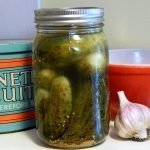Grandma’s Fermented Dill Pickles
This traditional recipe makes fermented pickles really easy. Just pack them in a jar and leave them in a dark, cool location for up to 6 months! Skip the work of canning and enjoy probiotic pickles all winter long.
- Prep Time: 10 minutes
- Total Time: 10 minutes
- Yield: 2 quart jars 1x
- Category: Pickles
- Method: Fermented
- Cuisine: Polish
- Diet: Gluten Free
Ingredients
Units
Scale
Icing
- 2 lbs pickling cucumbers
- 1/3 cup pickling salt
- 4 cups water (chlorine-free)
Pickling Brine
- 2 cups of chlorine-free water
- 1/4 cup vinegar (5% acidity)
- 2 tbsp pickling salt
Packing in each quart jar
- 1 tsp grated horseradish (see notes for alternatives)
- 1 sprig of dill
- 1 tsp mustard seed
Instructions
- Trim the blossom ends off the cucumbers.
- Mix the icing solution using cold water, and let the cucumbers soak in the icing solution overnight (for 8 to 18 hours). Keep the cucumbers submerged in the icing solution by weighing them down with a dinner plate or bags of ice. If it’s really warm in your house, stash them in the fridge for the icing.
- Once you’ve set up the cucumbers for icing, mix the pickling brine ingredients (vinegar, salt, and water), bring them to a boil, and simmer until the salt dissolves.
- Divide the hot brine between two sterilized 1-quart mason jars and allow it to cool overnight.
- The next morning, drain the cucumbers from the icing solution and pack them into the brine-filled mason jars, along with the dill, horseradish, and mustard. Use a weight to keep the pickles below the brine and leave at least 1 inch of headroom at the top of the jar.
- Put a lid on the jar that will allow gas to escape while keeping out mold and other contaminants. (See the section above for different jar and lid options). Store the jar in a cool dark location.
- The pickles will bubble and ferment for 4-5 days, but leave them undisturbed until you are ready to eat them. The flavor is best if they ferment for at least 1 month, however, they will last in a cool, dark location for up to a year.
Notes
- The small amount of vinegar isn’t enough to prevent fermentation. It is just enough to add the acidity needed to ensure a good ferment.
- If you don’t have horseradish you could use a pinch of black tea. It helps prevent the pickles from getting too soft.
- The brine should be enough to cover the pickles if you pack them tightly into the jars. If you can’t fit all the cucumbers in, it’s fine to add a bit more water to ensure everything is below the brine. There’s no need to add more salt or vinegar. The amount included is perfect for 2-quart jars.
- Always be extra cautious with any long-term ferment. See the section above for some tips, including how to sanitize your jars.
- Never eat anything that looks or smells bad. Fermented pickles usually get a dusting of white on them and the bottom of the jar. This is either the spent yeast (from fermenting) or the salt. It is not an issue. If you’re concerned, check out this reference for any pickle problems.
Nutrition
- Serving Size: Approx. 1 pickle
- Calories: 19
- Sugar: 1.9g
- Sodium: Approx. 184mg
- Fat: 0.1g
- Carbohydrates: 4.2g
- Fiber: 0.6g
- Protein: 0.7g
Find it online: https://www.fermentingforfoodies.com/grandmas-fermented-pickles/
